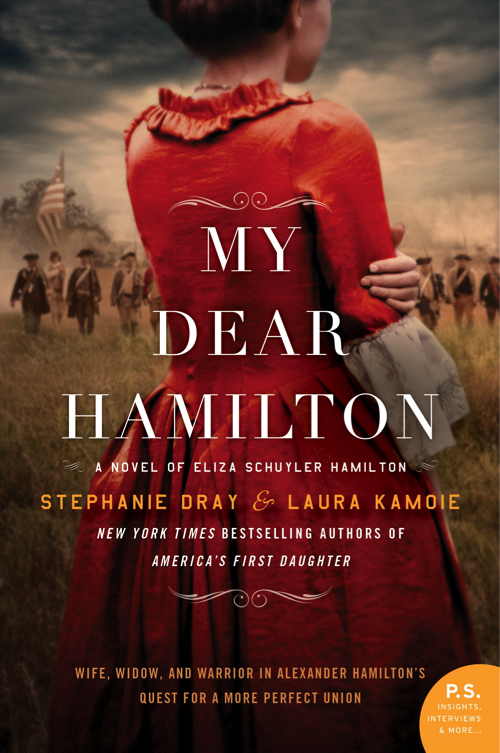My Dear Hamilton

A Novel of Eliza Schuyler Hamilton
Available in ebook, paperback, hardcover, large-print, and audiobook
From the New York Times bestselling authors of America’s First Daughter comes the epic story of Eliza Schuyler Hamilton--a revolutionary woman who, like her new nation, struggled to define herself in the wake of war, betrayal, and tragedy. Haunting, moving, and beautifully written, Dray and Kamoie used thousands of letters and original sources to tell Eliza’s story as it’s never been told before--not just as the wronged wife at the center of a political sex scandal--but also as a founding mother who shaped an American legacy in her own right.
A general’s daughter…
Coming of age on the perilous frontier of revolutionary New York, Elizabeth Schuyler champions the fight for independence. And when she meets Alexander Hamilton, Washington’s penniless but passionate aide-de-camp, she’s captivated by the young officer’s charisma and brilliance. They fall in love, despite Hamilton’s bastard birth and the uncertainties of war.
A Founding Father’s wife...
But the union they create--in their marriage and the new nation--is far from perfect. From glittering inaugural balls to bloody street riots, the Hamiltons are at the center of it all--including the political treachery of America’s first sex scandal, which forces Eliza to struggle through heartbreak and betrayal to find forgiveness.
The last surviving light of the Revolution…
When a duel destroys Eliza’s hard-won peace, the grieving widow fights her husband’s enemies to preserve Alexander’s legacy. But long-buried secrets threaten everything Eliza believes about her marriage and her own legacy. Questioning her tireless devotion to the man and country that have broken her heart, she’s left with one last battle--to understand the flawed man she married and imperfect nation he could never have created without her…
PROLOGUE
Spring 1825
The Grange
Harlem, New York
The promise of liberty is not written in blood or engraved in stone; it’s embroidered into the fabric of our nation. And so is Alexander Hamilton.
My husband. My hero. My betrayer.
READ MOREThough Hamilton is more than twenty years dead now, his memory lingers where I stand in the garden of tulips, lilies, and hyacinths we once planted together. He is inescapable in even the smallest things. I cannot buy a pouch of seeds for this garden without money from the mint that he established. I cannot pass a newsboy on my walks through the city without seeing the paper he founded or without reflecting upon the freedoms for the press he helped guarantee. I cannot cast my gaze at the busy ships in the harbor without seeing the trade he assured, or the coast guard that he founded, or the industry and opportunities he provided for the people who now flock to our shores in search of freedom and a better future.
In short, there is not a breath in any American’s life that is not shaped in some way by Alexander Hamilton. Certainly not a breath in mine. His memory, which I must honor for the sake of our children if nothing else, is impossible for me to escape.
Though I confess I have tried.
In the secret seethings of my discontented heart, I’ve searched for a life that is my own. A life not consumed by the questions he left in his wake—riddles I will never solve about our marriage, our family, and the suffering to which he exposed us. I’ve searched for a meaning to my existence not swallowed up by Hamilton’s shadow. By his genius. By his greatness. By his folly.
And by his enemies.
For in the battle for history—a war for truth, fought against time—I am a veteran. I’ve been fighting that battle for decades, and perhaps never more ferociously than now, within myself, as I stare at the paper in my hand. Squinting beneath my bonnet against the sunlight, I see a calling card, unremarkable but for the single name etched in the center with bold ink.
James Monroe.
At the sight of it, an unexpected pain stabs beneath my ribs, where my heart picks up its pace. My basket of purple hyacinths lies forgotten at my feet as I stand up, a little breathless. For the only thing more astonishing than the name itself is that the card is folded at the corner, indicating the former president personally delivered it, rather than sending a servant.
I should feel honored.
Instead, I’m incensed that James Monroe has darkened my doorstep. And before I can stop myself, my voice drops low, as it always does when I’m angry. “What has that man come to see me for?”
“Couldn’t say,” my housekeeper murmurs, straightening her apron. “But he’s waiting for you in the parlor.”
It’s not the protocol for a gentleman to present a card and wait, except when presuming upon familiar acquaintance. And though Monroe definitely is a familiar acquaintance—and more than an acquaintance besides—he has no right to presume upon our old intimacy. No right at all. Not after everything that has passed between us. Especially not when he’s caught me out in the yard, in my gardening gloves and black workaday bombazine frock.
He should not expect, even under the best of circumstances, that I would receive a man of his rank and stature on a moment’s notice. But then James Monroe has always been wilier than anyone gives him credit for, and I imagine that he’s counting on the element of surprise to work to his advantage.
“Doubtless he’s come to pay his respects to you,” the housekeeper says.
And I give the most indelicate snort of my life, because I think it more likely Monroe has come to collect my surrender. For years now, to promote his so-called Era of Good Feelings, a popular President Monroe cut a swath through cities and towns, using his southern drawl and amiable manner to smother every last vestige of dissent. And charmed, no doubt, by that infernal dimple in his chin, everyone has genuflected.
Everyone but me.
Which is why I suppose he cannot retire in complete victory until he can boast of having been reconciled with the wife of Alexander Hamilton. But there are no good feelings here. And even though I’m not completely reconciled with Hamilton myself, I have no wish to become Monroe’s final triumph.
As I clutch the card, much perturbed, the housekeeper prompts me. “Ma’am, you wouldn’t want to leave the gentleman waiting.”
Oh, but I do want to. I’d happily leave Monroe standing on the stoop of the house Alexander Hamilton built until the Virginian is bent with age and crumbling to dust. But he’s already invaded my parlor so I must deal with him. And I must deal with him myself. To do otherwise would be to discount a lifetime of lessons from my father, a general who taught me that when faced with the specter of defeat, one must meet it swiftly and with as much dignity as possible. So I remove my garden gloves, scoop up my basket of hyacinths, and say, quite grandly, “I will see him.”
After that, I don’t so much walk into the Federal-style yellow house as march into battle. I find Monroe in the old, faded parlor, standing before a dark sofa I embroidered to hide where it has become threadbare. The gentleman greets me, his familiar expression grave, hat clutched in his now aged hands.
And from ten paces, I take the measure of him.
Six feet tall, square-shouldered, and rawboned as ever, Monroe is wearing antiquated black velvet knee breeches, long since gone out of fashion, which leads me to imagine the silver in his hair is powder from a bygone era. A showman when it comes to reputation, Monroe must be pleased, I think, to count himself in that pantheon of presidents my countrymen now venerate.
Washington, the father of the country. Adams, the mastermind of independence. Jefferson, the voice of the revolution. Madison, the father of the Constitution.
And Monroe, the last of the founders.
Or so they say. But if Monroe must be counted as the last, then by my reasoning, my husband was the first. For not one of these men would have ever become president without Alexander Hamilton, the architect of our very government.
Yet Monroe doesn’t even glance at the portrait of my husband that hangs where the piano used to be—long since sold off to keep a roof over my children’s heads.
Perhaps I cannot blame Monroe for avoiding the eyes of Hamilton’s portrait. After all, even for me, the likeness still churns up a noxious stew of resentment, guilt, and loss. And I am not the only person in this world who loved the man and hated him, too.
So I nod to Monroe.
I should invite him to sit. I should serve tea. A thousand niceties are dictated by social grace when a president—even a former president—comes to call. But I observe none of them.
Instead, I wordlessly wait for him to deliver the first volley.
Finally, with a formal bow, Monroe drawls, “Mrs. General Hamilton.”
Why does it suddenly bother me to be addressed this way? It’s the title by which I’ve been known for almost thirty years. A title in which I’ve taken pride. A title some would say has opened as many doors as it has slammed shut. But somehow, hearing myself addressed as Mrs. General Hamilton by James Monroe feels as I’m being forced by him, for a second time, to loyally claim Hamilton as my own.
And Monroe—as much as any person still alive—has cause to know just how much that loyalty cost me.
Now Monroe rises up from his bow with the hint of the smile I once found so charming. He clears his throat and begins, haltingly. “It’s been many years since we first met . . .”
Oh, after everything, is he truly appealing to our history?
As if I’ve forgotten. But I haven’t. Not for a moment. Especially not recently, when the approach of the fiftieth anniversary of our independence reminds me daily of how my life has been entwined with the creation of this nation.
Monroe’s, too, I must, in justice, admit.
At the start, I was a general’s daughter and he was a handsome war hero. And now I stare at Monroe, wondering if he still has that bullet lodged in his shoulder, or if a surgeon ever managed to dig it out . . .
But I don’t ask. I don’t say anything. In truth, I take perverse pleasure in the pained yearning I imagine I see upon Monroe’s face as I force him to founder against the wall of my silence. Silence is often the only weapon available to ladies. And I wield mine expertly.
In the thick awkwardness, Monroe clears his throat and continues what seems a rehearsed speech. “Yes, it’s been quite a long time since we met. I find that the lapse of time brings its softening influences. Now we are both nearing the grave, when past differences can be forgiven and forgotten.”
Forgiven and forgotten.
I nearly scoff, but I’m determined to hold my tongue as an act of resistance—one of the few available to ladies. After all, despite what Hamilton believed, I am no angel.
But Monroe seems not to realize the war I’m silently waging against him, and his gray eyes are hopeful. Why shouldn’t he be hopeful? Napoleon Bonaparte once said that history is merely a set of lies agreed upon, and I know it would advantage me, and my family, to go along with all the little lies this new nation has agreed upon with regard to Alexander Hamilton. My sons will more easily find advancement if I do. My daughter might be courted by more respectable beaus. I myself might more comfortably mingle in society, if I so please.
All I have to do is surrender to James Monroe’s wish for reconciliation.
And I should. I know that I should. I have every reason to put the past behind me.
But as I stand there, trying to form conciliatory words, I am over aware of my husband’s portrait in its gilded frame, his extraordinary eyes looking down upon me. I turn my head toward the arched entryway, where his ghostly marbled bust has beckoned me, each night, like an intimate and a stranger. And I glance past that, to the doorway of the little green study in which I can still remember him toiling at his mahogany and satinwood cylinder desk, leather-bound books piled high on either side of him, ink smudges upon his hands, his quill scratching and candle burning late into the night.
Forgiven and forgotten.
If I am famous for anything, it’s for being a forgiving woman. And as for the forgetting . . . there are so many things I should like to forget. Forgetting would lift the weighty cloak of the past from my shoulders and make the present so much easier. But memory unalterably sets our compass, and guides us down paths we might have preferred never to have walked at all. And my path goes back all the way to the start. To the fathers of this country who fought and bled beneath a starry banner of red, white, and blue. To the mothers who were the menders, the sewers of flags, the darners of uniforms, the binders of wounds. And, in my case, the quilter of the torn scraps of old paper that remind me why we ever fought in the first place . . .
COLLAPSE
Pam Jenoff, New York Times Bestselling Author wrote:"A complete and very human portrait of Eliza will resonate with today’s readers. This is the perfect example of an epic fictionalized biography."
Karen White, New York Times Bestselling Author wrote:“Following their stunning success in America’s First Daughter, Stephanie Dray and Laura Kamoie have penned an unforgettable story of the woman behind Hamilton [...] My Dear Hamilton is a masterpiece that is both intimate in detail and epic in scope—a triumph!”
Kate Quinn, New York Times Bestselling Author wrote:“No study of Alexander Hamilton would be complete without reading this book [...] Full of history, engaging characters who shimmer on each page, and a tremendous love story, this is a book for everyone.”
Jennifer Chiaverini, New York Times Bestselling Author wrote:“My Dear Hamilton is a superbly written, meticulously researched homage to the birth of America [...] At once a wartime drama, a woman’s coming of age, and a lesson on politics that resonates in today’s world, My Dear Hamilton is the book of the year.”
Lauren Willig, New York Times Bestselling Author wrote:“My Dear Hamilton is a fascinating work of historical fiction, beautifully crafted and richly detailed. If you think you already know Eliza Schuyler Hamilton, her role in the founding of our country, her marriage, and her heartbreak, you’ll marvel at the woman you meet in this compelling novel.”
Author Stephanie Thornton wrote:“If you’ve ever wanted to banter with Hamilton or share a dish of tea with the Marquis de Lafayette, open the covers of My Dear Hamilton and step right in to Eliza Hamilton’s parlor [...] The gang’s all there!”
Author Ellen Marie Wiseman wrote:“Eliza Hamilton assumes her rightful place as one of America’s founding mothers as she guides first her husband and then her fledgling nation into the annals of history. My Dear Hamilton is historical fiction at its most addictive!”
Author Lars Hedbor wrote:“Beautifully written and meticulously researched, this stunning novel captures the courage, strength, and kindness of the remarkable woman behind Alexander Hamilton. A fascinating read!”
“An incredible, surprising, and altogether lovely tribute to the woman who stood beside one of the most unknowable, irascible, energetic, and passionate men wo contributed to the foundation of this nation.”


















